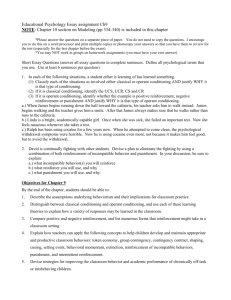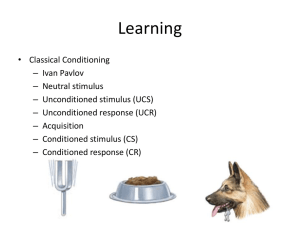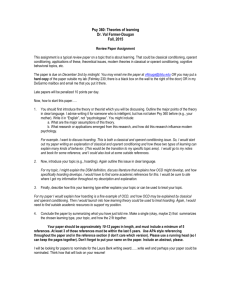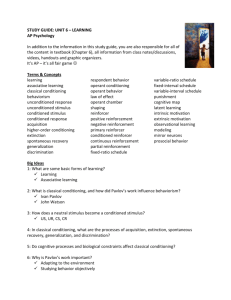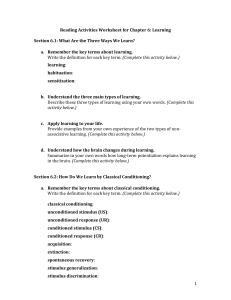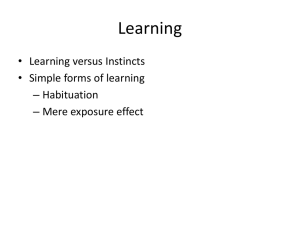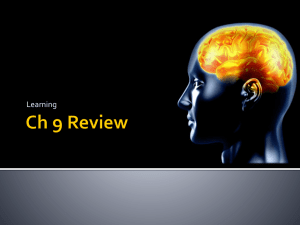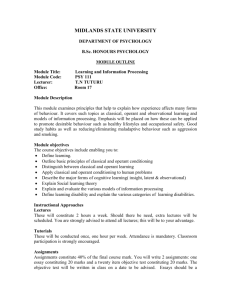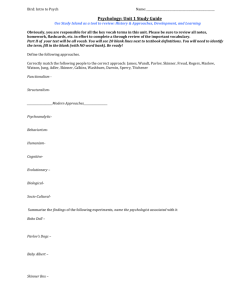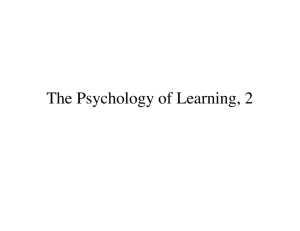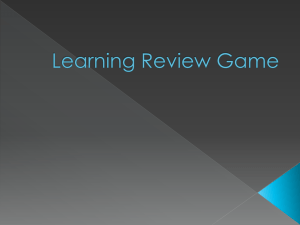Process of Learning
advertisement
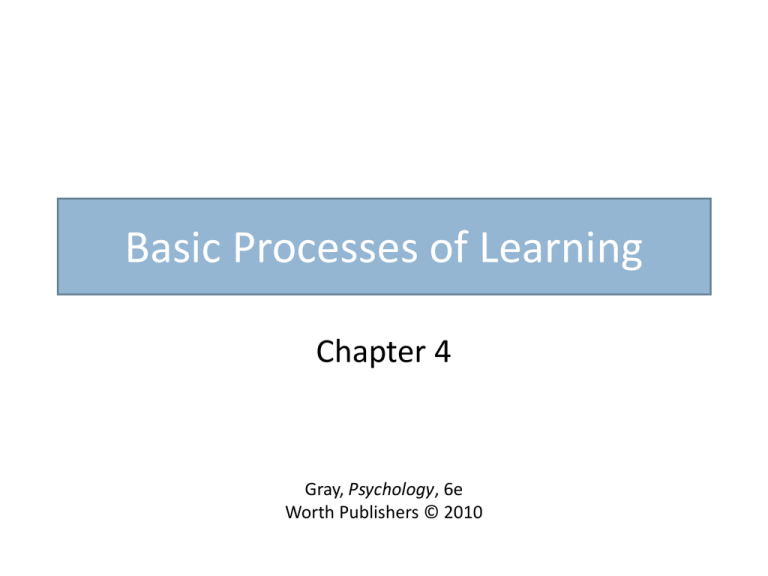
Basic Processes of Learning Chapter 4 Gray, Psychology, 6e Worth Publishers © 2010 Quick Question What is something that you have learned: – As a child – As a teenager – Last week What Is Learning? • Relatively permanent change to an organism’s behavior • Based on previous experiences the organism has had Contrasting Major Learning Theories Classical Conditioning Operant Conditioning Observational Learning Type of Behavior Learned Simple, reflexive behaviors Complex behaviors Behaviors useful in a social setting Process of Learning Pairing stimuli (that produce a response) Pairing a Observing the consequence actions of others with a response Overview of Classical Conditioning Classical Conditioning Can Help Us Understand: Type of Behavior Learned Simple, reflexive behaviors Process of Learning Pairing stimuli (that produce a response) • • • • Emotional responses Hunger Sexual arousal Substance abuse Classical Conditioning in the City (Midnight) (Subway noise) (Midnight) (Midnight, even in new location) (Wake up) (Subway noise) (Wake up) (Wake up) Advanced Concepts in Classical Conditioning • Extinction - without the UCS, eventually the CS will no longer produce the CR – If you move away from the subway (UCS), eventually you will no longer wake up at midnight (CS) • Spontaneous recovery - after time, the conditioned response might recur – Occasionally, you might awake at midnight in your new country home Advanced Concepts in Classical Conditioning • Generalization - the CR occurs in response to similar conditioned stimuli – All loud sounds wake you up - the subway, your neighbors yelling, your dog barking, your alarm clock • Discrimination - the CR occurs only in response to one specific CS (requires discrimination training) – Only your alarm clock wakes you up, you learn to sleep through the rest! Using the Principles of Classical Conditioning, Could You: • Teach a baby to fear books? • Teach a toddler to ride a tricycle? • Help your friend stop smoking cigarettes? How? Overview of Operant Conditioning Operant Conditioning Type of Behavior Learned Complex behaviors Process of Learning Pairing a consequence with a response Can Help Us Understand: •Animal training •Overjustification effect •School success •To Skinner, the sky was the limit! Reinforcement vs. Punishment Positive (+) Negative (-) Result Reinforcement Punishment Addition of desired stimulus after response Addition of aversive stimulus after response Example: Money for good grades Example: Spanking for bad grades Subtraction of aversive stimulus after response Subtraction of desired stimulus after response Example: A weekend away from bratty brother for good grades Example: No TV for bad grades Increased likelihood of response Decreased likelihood of response Reinforcement Schedules Interval Ratio (time between responses) (number of responses) Fixed (set reinforcement schedule) Reinforce a response after Reinforce a response after a set amount of time has a set amount of responses elapsed occur Variable (slightly altered reinforcement schedule) Reinforce a response around but not at the same time period Reinforce a response around but not after the same number of responses Advanced Concepts in Operant Conditioning • Shaping – Reinforcing responses that are increasingly close to the response you desire • Overjustification effect – When a reward is given for a response that was not needed to produce the response Help Train Fido! • How could you use operant conditioning to train a dog to: – Sit – Stop jumping on people – Jump through a hoop Overview of Observational Learning Observational Learning Type of Behavior Learned Skills useful in a social setting Process of Learning Observing the actions of others Can Help us Understand: •Skills that cannot be learned by trial and error •Prosocial and antisocial behavior Evolutionary Perspective • Species appear predisposed to learn certain things relevant to their past environment – Example: Food preferences - if we get ill after eating a new food, we learn to associate that food with illness and avoid it – Example: Fear - different species are predisposed to fear certain objects that posed a threat in the past (such as snakes for humans and monkeys) Something You’ve Learned What is something that you have learned: – As a child – As a teenager – Last week Turn to your neighbor and work together: – What learning theory best explains what you learned at each age? Assessment • What are the three major types of learning? • Come up with something specific a person might learn using one of these theories of learning

